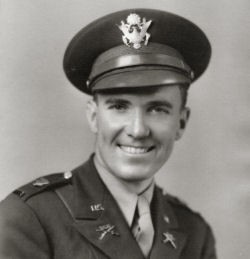
 |
Major Robert F. Burns90th Division, U.S. ArmyWar Letters from EuropeNormandy to Germany |
|
| Home | Military Career | Letters | Photos | Battles | References | ||
|
Letters from France June 22, 1944June 29, 1944 June 29, 1944 (2nd) July 6, 1944 July 17, 1944 August 10, 1944 August 14, 1944 August 25, 1944 September 1, 1944 September 2, 1944 September 3, 1944 September 3, 1944 (2nd) September 14, 1944 September 16, 1944 September 16, 1944 (2nd) September 17, 1944 September 28, 1944 October 2, 1944 October 14, 1944 October 22, 1944 November 2, 1944 November 12, 1944 November 24, 1944 December 2, 1944 December 27, 1944 Letters from Luxembourg January 9, 1945January 16, 1945 January 20, 1945 Letter from Belgium February 7, 1945Letters from Germany February 9, 1945February 21, 1945 February 23, 1945 February 26, 1945 April 5, 1945 May 5, 1945 Letters from Czechoslovakia May 10, 1945May 16, 1945 Letters from Germany May 19, 1945May 20, 1945 May 24, 1945 June 3, 1945 June 22, 1945 Letters from France June 30, 1945July 3, 1945 Letters from Germany July 14, 1945July 27, 1945 July 30, 1945 August 3, 1945 August 14, 1945 Letters from France August 26, 1945August 28, 1945 August 29, 1945 Letters from Germany September 9, 1945September 11, 1945 September 13, 1945 September 15, 1945 September 17, 1945 September 23, 1945 September 27, 1945 October 1, 1945 October 9, 1945 Letters from France October 13, 1945October 15, 1945 October 22, 1945 November 5, 1945 November 17, 1945 November 17, 1945 (2nd) November 23, 1945 November 30, 1945 December 17, 1945 December 17, 1945 (2nd) December 18, 1945 December 26, 1945 January 2, 1946 Letters from Belgium January 14, 1946January 15, 1946 January 17, 1946 January 17, 1946 (2nd) Letters from France January 21, 1946January 24, 1946 |
Weiden, Germany May 24, 1945 Dear Mom, The ride back through Czechoslovakia was one of the prettiest you can imagine. The farms were very well kept up and nearly all had rather new-looking coats of calcimine, which seems to do for paint over here. (I guess that's what it is. It comes off whenever you brush against it.) Many buildings were white, but there was a great deal of color too: blues and reds and yellows and pinks. Nestled among the rolling green hills these colorful villages with their orange roofs stepped one above the other and their oriental-look church steeples were like a tiny fairyland. They were surrounded by newly blown trees of brilliant fresh green and rolling acres of young green shoots. Here and there were long patches of bright yellow. I don't know what their crop is, but it certainly was striking, especially from a distance. As we climbed the mountains which lie between the two countries we could look back and see all this against a background of deep blue sky with fat cumulous clouds of a bright sunny day. Here at last in native peasant clothes, the bent figures hard at work in the fields would pause to wave at us. So too did numerous lazy ones sunning themselves by the swift-running streams. Every village had its hastily constructed archway at the entrance and exit bearing these inscriptions: "We thank our liberators" "Welcome Americans and British". Others were in Russian and expressed, I presume, similar sentiments. It was with no little regret we left this bright colored land with its gay flags, its smiling, sun-tanned people and its drowsy sun-filled climate. The change to Germany even from the Sudetenland was marked. As we drove through the deep forests of the border, a kind of drabness seemed to settle everywhere. Gone were the brilliant flags. Only listless white cloth hung from the windows now. The people stared without welcome and the life seemed to have fled from the landscape. Now the rains continue as they have for some days past. It comes in angry spurts, striking the earth with fury and crackling with lightning. Then it stops as abruptly as it begins. The sun comes out, shivers briefly, and retires again in its blanket of clouds. The mysteries of European plumbing continue to puzzle me. The Germans are somewhat more progressive than others in that they have many more inside toilets and flush toilets at that. But why they locate them where they do is beyond me. Nearly all are surrounded by other rooms with the only ventilation opening into one of them. It was somewhat the same in Czechoslovakia. Bathrooms are still a rarity here, though somewhat more common than in France. The kitchen sink is something you dream about. Here it is a spigot about two feet above a half bowl. If you attempt anything more than filling a pot or pan, you get water all over the floor. I think I've already written about their heating stoves. They are many and varied, but most common are the huge tile affairs which stand as tall as a man and are two feet deep and two to four feet wide. Withal, they have the smallest fire box you've seen. Most of them have a bake oven above. Strangely enough, they do give off heat but it seems like a terrific waste. Their coal is more usually a kind of pressed coal - called "briquettes" and they come in various shapes from that of a small brick to half chunks. The real coal is frequently in huge pieces which have to be broken up, making a mess. The little briquettes are quite clean and easy to handle and burn without much ash. Nearly all kitchen stoves are wood or coal burners. I've seen very few electric stoves or gas stoves except in wealthier areas. Love, Bob |
| Home | Military Career | Letters | Photos | Battles | References |
| Contact: mtburns@robertfburns.com | Copyright © 2013-2018 Marie T. Burns |